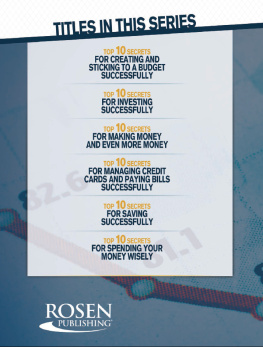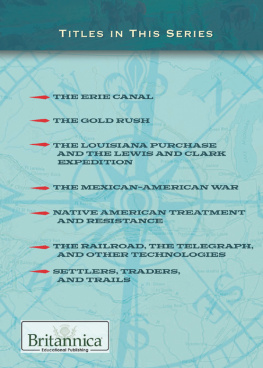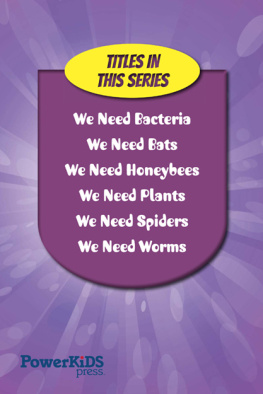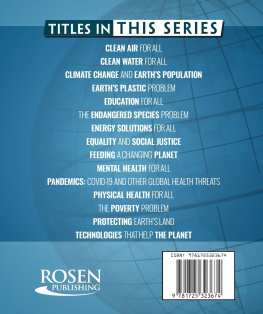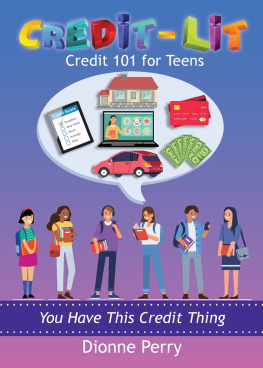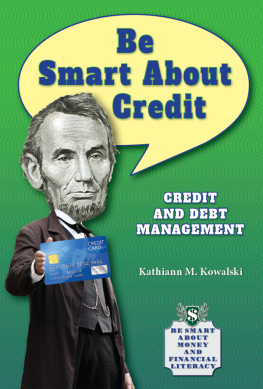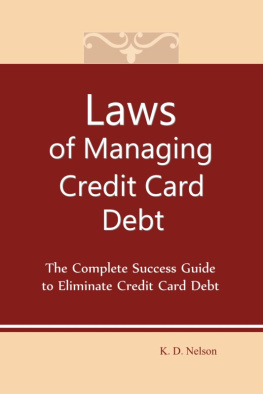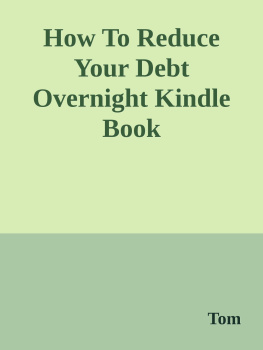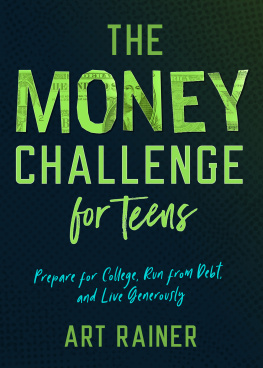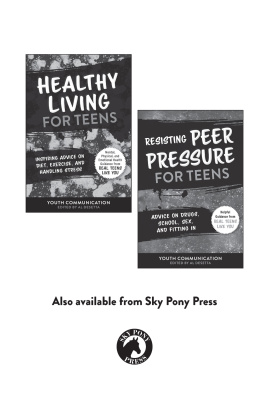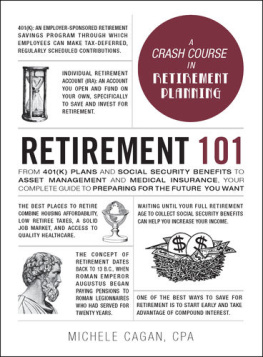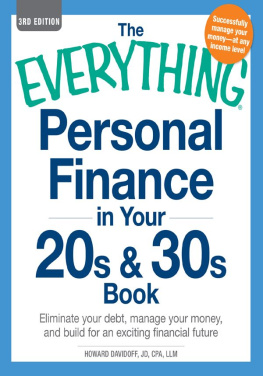Published in 2014 by The Rosen Publishing Group, Inc.
29 East 21st Street, New York, NY 10010
Copyright 2014 by The Rosen Publishing Group, Inc.
First Edition
All rights reserved. No part of this book may be reproduced in any form without permission in writing from the publisher, except by a reviewer.
Library of Congress Cataloging-in-Publication Data
Shea, Therese.
Top 10 secrets for managing credit cards and paying bills successfully/Therese Shea.First edition.
pages cm.(A students guide to financial empowerment)
Includes bibliographical references and index.
ISBN 978-1-4488-9358-4 (library binding)ISBN 978-1-4488-9376-8 (pbk.)ISBN 978-1-4488-9377-5 (6-pack)
1. Credit cardsJuvenile literature. 2. Finance, PersonalJuvenile literature. 3. Consumer creditJuvenile literature. I. Title. II. Title: Top ten secrets for managing credit cards and paying bills successfully.
HG3755.7.S54 2014
332.02402dc23
2013000913
Manufactured in the United States of America
CPSIA Compliance Information: Batch #S13YA: For further information, contact Rosen Publishing, New York, New York, at 1-800-237-9932.
Contents
Introduction
Secret #1
You Might Not Need a Credit Card
Secret #2
Read the Fine Print
Secret #3
Due Dates Matter
Secret #4
Paying the Minimum Is a Major Mistake
Secret #5
Read Statements and Bills
Secret #6
Keep That BillAt Least for a While
Secret #7
Cash Advances Are Too Good to Be True
Secret #8
Pick Up the Phone
Secret #9
Be Careful with Personal Information
Secret #10
Always Think Ahead
Glossary
For More Information
For Further Reading
Bibliography
Index
Responsible consumers think before they use their plastic, as people sometimes call credit cards. Credit cards can give people an artificial feeling of financial security.
Introduction
M any young people are excited when they get their first jobespecially for the financial opportunities that come with a paycheck. They envision being able to buy what they need and what they want. But they should be cautious with this newfound ability. Todays culture encourages us to spend without thinking of the future. Commercials, billboards, and other advertisements persuade us to direct our money toward a variety of products and services.
Sometimes the steady income of a job means the ability to open and use a credit account. Many people are thrilled to get their first credit card. Looking at a credit limit of perhaps $1,000 or more makes the imagination run wild: Vacations! Clothes! Concert tickets! But this is how many fall into debt.
As recently as 2010, students walked into college bookstores to find tables of credit card representatives giving out T-shirts, towels, and other gifts to those who filled out applications. Young people needed only to open their mailboxes or e-mail accounts to find offers from credit card companies waiting. College-age students were major targets of credit card companiesand for good reason. They made credit card companies a lot of money with the debt they acquired, even if they used their cards only for books, tuition, and other necessities.
In 2009, the federal government tried to halt this slippery slope for young people. The Credit Card Accountability, Responsibility, and Disclosure (CARD) Act banned the exchange of free gifts for credit cards and urged colleges to remove credit card vendors from campuses. Under this law, people under age twenty-one now face several obstacles to getting a credit card, though many still do obtain them.
If you are one of these young people, you do not have to fall into the credit card trap. You can make credit work for you and avoid accumulating a mountain of debt. Paying your credit card and other bills helps you build the foundation for a healthy financial future. Smart use of your money can convince lenders that you have the capability to handle the debt for the car or house of your dreams. It can also help you pay for these items outrightwithout assuming more debt!
Many adults still struggle with debts accrued in their younger years. Some never mastered simplethough not always easyways to manage their bills successfully. Learning just a few rules early in your financial life can really pay off down the road.
Secret #1
You Might Not Need a Credit Card
I magine that you asked someone for money every time you used a credit card. Now imagine that a month later, that person is knocking on your door asking for the money back. That is essentially what is happening when you use a credit card. Many young people think a credit card is a must. However, credit cards are not a necessity, especially for those still living at home. Before even considering a credit card, young people should ask themselves why they want one. Is it so they can have ready access to money? This is dangerous reasoning. So many people of all ages forget that credit is just a loan.
Is It Time for Credit?
There are some good reasons to get a credit card. Credit cards are handy to have in urgent situations. Young people attending college and living away from home might find themselves in an emergency. They might not have enough money to cover an unexpected cost, such as a car repair. In a situation like this, it makes sense to use a credit card rather than waiting and saving up the money to repair the car.
Another reason people get a credit card is to build a credit history. A credit history is a record of an individuals borrowing and repaying behaviors. Credit reports list credit card accounts, how long each has been used, amounts owed, and whether bills are paid on time. Other types of credit accounts are also included, such as mortgages and car loans. Most creditors, or the businesses to which people owe money, send monthly reports of transactions to a credit report agency, also called a credit bureau.
Other kinds of businesses, such as cell phone and utility companies, may or may not report to a credit bureau. However, if they turn over an unpaid debt to a collection agency, that will likely end up on the report. Companies often hire a collection agency to handle collection on a debt after several missed payments. Some debt agencies buy debts for less than the actual amount and then try to collect the full amount. A collection note on a credit report damages someones credit history and remains a stain for a number of years.
Information on a credit report contributes to an overall credit score. The score is a quick way for lenders and creditors, such as credit card companies, banks, and mortgage companies, to find out if someone is likely to pay back a loan. Someone with no credit history may be considered as much of a risk as someone with a low credit score. Beginning this history is a legitimate reason to get a credit card. However, credit can be built in other ways, too, such as paying a car loan on time.
Cars can be expensive when things go wrong. Many people use credit cards to pay for car repairsbut they need to be able to pay the credit card company soon afterward.
Fascinating Financial Fact
Credit scores are sometimes called FICO scores because they are produced with computer software developed by Fair Isaac Corporation, or FICO. The three major U.S. credit bureaus are Experian, TransUnion, and Equifax. Each may have a different credit score for an individual as they may receive different information. FICO scores range from 300 to 850.

